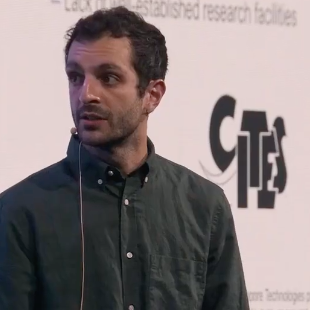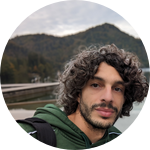About This Project
Hammerhead sharks are obligate ram-ventilator, needing constant motion to breathe. Recent studies on S. mokarran and S. lewini reveal they can reduce energy by swimming sideways, showing a rhythmic rolling behaviour. This behaviour hints at possible circadian control, suggesting microsleep cycles during the day and navigation recalibration at night. The SCUBA project aims to understand these rhythms through tracking and manipulation, offering insights for conservation strategies.
Ask the Scientists
Join The DiscussionWhat is the context of this research?
Hammerhead sharks, including the critically endangered species Sphyrna mokarran, S. lewini, and S. zygaena, face numerous threats such as overfishing and habitat destruction. Conservation efforts are gaining momentum, driven by global initiatives like the European Green Deal and UN Goal 14. Understanding their biology, including circadian rhythms, is crucial for effective conservation. While most organisms have evolved circadian clocks to adapt to Earth's rotation, sharks in constant environments or with unique behaviors challenge conventional understanding. Research on their rhythmicity and clocks is incomplete, raising questions about their necessity and function in these species.
What is the significance of this project?
Hammerhead sharks (HS) are semipelagic obligate ram ventilators, requiring constant motion to oxygenate their gills. Recent findings suggest they minimize energy expenditure by using their dorsal fin and swimming on their sides. Despite their perpetual activity, they exhibit rhythmic rolling swimming behavior (RSB), particularly pronounced during the dark phase. Understanding the regulation and significance of this ultradian rhythm is crucial for appreciating their ecological role and susceptibility to environmental changes, informing effective conservation strategies.
What are the goals of the project?
Under the mentorship of Prof Nicholas Payne from Trinity College Dublin , Dr Mark Royer from the Hawaiʻi Institute of Marine Biology and Prof Emilio Sperone from the University of Calabria, I aim to explore the biological basis of the rhythmic rolling swimming behavior (RSB) in the Scalloped Hammerhead Shark (Sphyrna lewini). Through an interdisciplinary approach blending chronobiology, experimental biology, telemetry, and population genetics, the research will elucidate the function of RSB, identify circadian influences, and uncover genetic markers driving phenotype plasticity.
Budget
The SCUBA project has been funded by the Italian Govt (PNNR- National Recovery and Resilience Plan). While the funds support the researcher's salary and bench fees, they do not cover consumables and equipment. The budget indicated here will be dedicated to the purchase of portable laboratory equipment (BentoLab and MinION) that will be used to perform epigenetic analysis on tagged shark to try to identify genetic markers responsible for intra-population variability. Moreover, Magnets, petroleum jelly and heavy plastic sheets will be used to reversibly interfere with the sharks major sensory centres.
Endorsed by
 Project Timeline
Project Timeline
The SCUBA project, initiated in January 2023, has accumulated sufficient evidence supporting the existence of endogenous clocks in hammerhead sharks. Moving into phase 2, we are poised to commence tagging and sensory deprivation experiments throughout the upcoming summer, with a targeted completion by summer 2025. Alongside the tagging process, biopsies will be obtained to analyse the epigenetic signature of each shark.
Apr 30, 2024
SCUBA phase 2 launch
May 02, 2024
Project Launched
Jun 30, 2024
Procurement of Equipment and Consumables
Aug 01, 2024
Begin Tagging expedition at HIMB (including behavioural experiments)
Apr 30, 2025
End of tagging expedition
Meet the Team
Affiliates
Giorgio Fedele
I am a Research Fellow at the University of Calabria.
Throughout my academic and professional journey, I've pursued diverse scientific research fields, thriving in top-level international laboratories. Beginning with a BSc in Marine Biology from the University of Padua (IT), I honed skills in population genetics and molecular adaptation while studying carbonic anhydrase genetic evolution in Antarctic fishes. Transitioning to an MSc in Evolutionary Biology at the University of Padua (IT), I delved into the allelic distribution of genes shaping seasonal behaviours in Drosophila melanogaster populations at the University of Leicester (UK). Driven by my passion for environmental and animal behavior relationships, I pursued a PhD and subsequent post-doc in Genetics and Chronobiology, exploring magnetoreception mechanisms and their link to the circadian clock in D. melanogaster. My research involved extensive behavioural and molecular biology experiments, requiring adept planning, troubleshooting, and analysis skills. Joining the MRC Toxicology Unit at the University of Cambridge (UK), I expanded my expertise to include novel metabolomic assays like lipidomic and respirometry. Amidst the COVID-19 pandemic, I contributed significantly as a Development Scientist at the Rosalind Franklin Laboratory, leading the development and deployment of Europe's largest SARS-CoV-2 testing facility while supervising a team of scientists.
Lab Notes
Nothing posted yet.
Project Backers
- 0Backers
- 0%Funded
- $0Total Donations
- $0Average Donation

